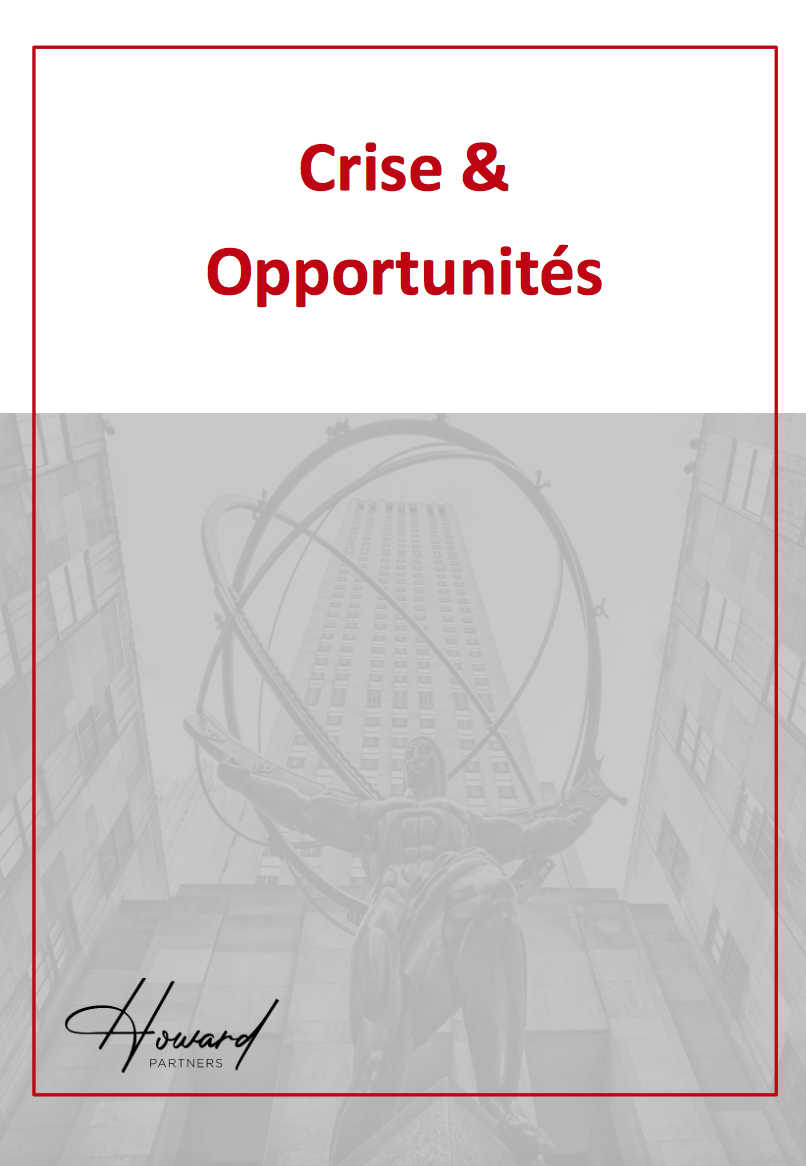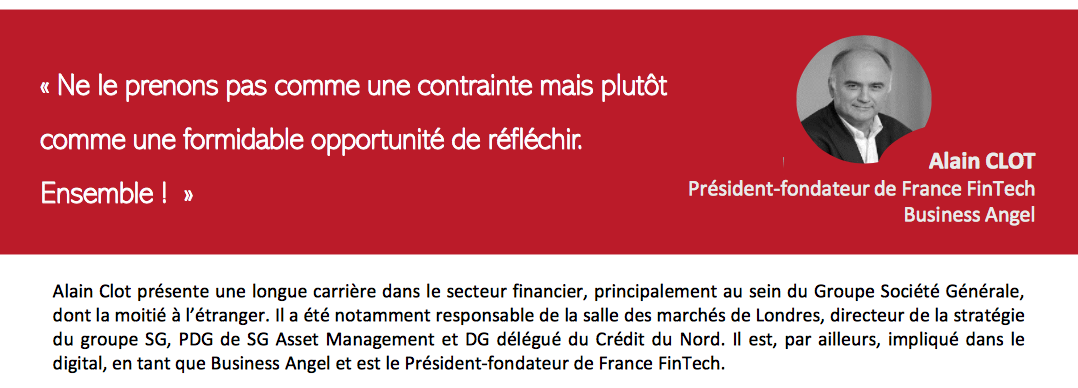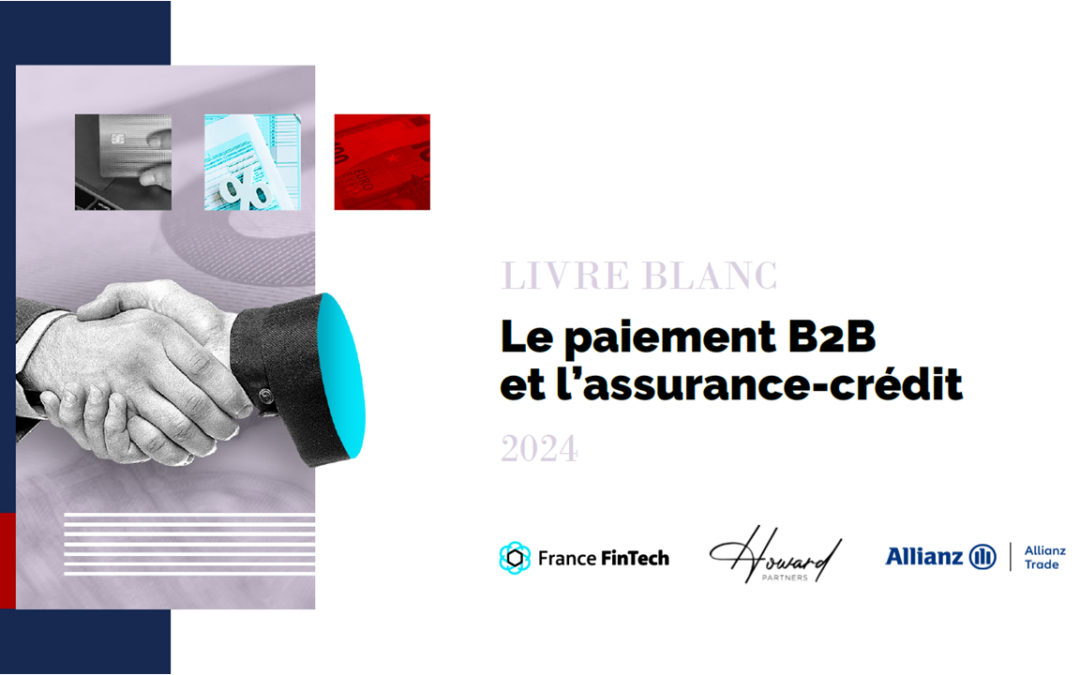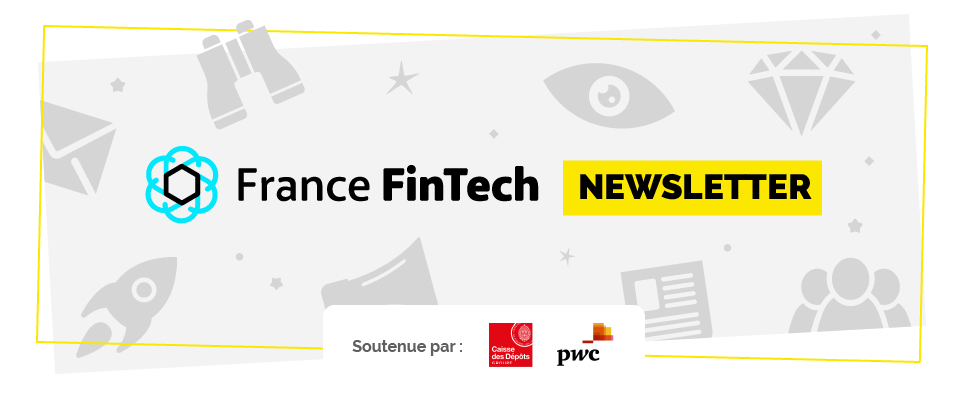COVID 19: what if we took the opportunity to think?
 COVID 19: what if we took the opportunity to reflect?
COVID 19: what if we took the opportunity to reflect?
by Alain Clot, President of France FinTech
Sent back to my homes for reasons of confinement, like everyone else, I went through phases of astonishment, worry, irritation sometimes in front of the unfolding of the faults inherent in this type of crisis: explosion of attempts at fraud, disinformation and conspiracy on all levels, irresponsible denial of danger or destructive catastrophism and especially this very French propensity to judge, condemn, denounce and self-proclaim knowing (65 million experts…).
I think the sentence that irritates me the most is "I told you so" ... But also admiring the courage of so many caregivers, firefighters, police officers, cashiers, garbage collectors, bank employees, entrepreneurs, civil servants. Further proof if needed that we are a great nation and that union and solidarity are strength.
Let us not forget this in this digital age which threatens everywhere the mutualizations which are nevertheless the very foundation of our society. And of course happy to be able (finally) to read, think and think about this situation. I am old enough to know that we must not fall into the old antiphon "the world will never be the same as before", that we are pressed into each crisis with a sententious and mysterious air.
It seems to me that, if this crisis has some marked specificities (universal aspect geographically and sectorally in particular), it will probably result more in an acceleration of pre-existing trends than in a rupture proper:
- Increased "distance" between producers (including public) and customers-users-users. One only needs to see, for example, the explosion in the use of banking applications to understand that the digitization of financial services will experience a strong acceleration. And this is true in almost all sectors. Hard times for traditional distributors who must hurry in their reflections.
- Growing and soon to be central role of data technologies, foremost among which is artificial intelligence, which is decisive in the four challenges of financial services: customer knowledge, advice, risk management and productivity. AI will make it possible to find industrial solutions to the challenge of reconciling mass processing and individualization of the solution, which could be formulated by the oxymoron: industrializing individualization.
- Unprecedented threat posed by Big Tech (GAFAM and BATX), the real big winners from this crisis and who are now primarily targeting financial services.
- Growing use of innovative ways of organizing work : teleworking, “freelancing”, partnerships. According to recent studies, the majority of those under 35 plan to leave their employer within two years and favor the culture of craftsmanship. Astonishing turnaround ...
- New relationship to trust and widespread questioning of traditional authorities, experts and intermediaries.
This period calls, in any case, to update strategic thinking. Allow me on this subject to suggest a few leads.
The first is the vital importance of developing a vision (this is also true at the level of the Nation and the Company). A vision is not an exercise in forecasting, nor a linear projection of current trends. It is an attempt to clarify convictions, supported hypotheses, projection or rupture scenarios. It is also the consensus on which the social body must be based.
The second is that this strategic reflection benefits from being based on the following principles :
- The value chain must be redefined, finely, then wondering, link by link, on the identification of the "regalian (What is at the heart of value) and what can and should be outsourced, or even abandoned. The resources of the company, first and foremost men and time, must be concentrated on this regal.
- A deep and detailed reflection on outsourcing (neither too proprietary in its approach, nor weakened by excessive or too distant subcontracting) is opportune.
- The observation of competition, best practices and technology ("benchmark") is more than ever vital. It is now carried out 360 °: a bank must constantly observe not only its peers, but also now fintechs, insurers, mass distribution, Big Tech, AI labs and universities, etc.
- You have to adapt to the reflection and action in durably uncertain universe and to be honest, unpredictable: continuously updating its vision, diversifying its strategic options, accepting to experiment.
- Take into account that " time is shortening ”. The “Time to Market” has become a key concept. Overquality or late perfection kills at least as much as their opposite.
- The strategic break does not fit well with "democratic" processes. She does not submit to the vote. This is obviously not politically correct and even disturbing for our republican and participatory consciousness. But groups performing in a period like this define at the head, without procrastination, the necessary adjustments and execute them without trembling. The “Bottom Up”, so fashionable, is ill-suited to the need for a strategic break. On the contrary, this does not exclude listening, teaching and appropriation by the whole social body.
- It would be inconsistent to "restart the machine" without a much stronger consideration of the imperatives of sustainable development. Because the state of the planet requires it, but also because neither employees nor customers will accept the status quo.
Finally, I would like to conclude this short comment with the aspect that seems to me the most important in this era of profound change. Very simply formulated, I would say: the complex subject is not technology but culture and that's what's the hardest thing to change. The engine of society is more than ever the youth, the “millennials” and their new expectations. For the first time in history, we learn more technically from our children than from our parents and it is the youngest who give the “la”. And this will probably still be verified for the next generation. You have to learn to speak the language of this “Petite Poucette” age group, as Michel Serres called it.
The relationship to technology, data, innovation in general is also a cultural subject. Learning from smaller than oneself, or from younger ones, taking risks, experimenting, accepting to fail, learning from mistakes, starting over, “pivoting”, or sharing research are no longer options but ardent necessities .

Editorial published for the Crise & Opportunité white paperHoward Partners

White paper B2B payment and credit insurance
Download our white paper!

#204
GO GO GO! ALE ALE ALE!
